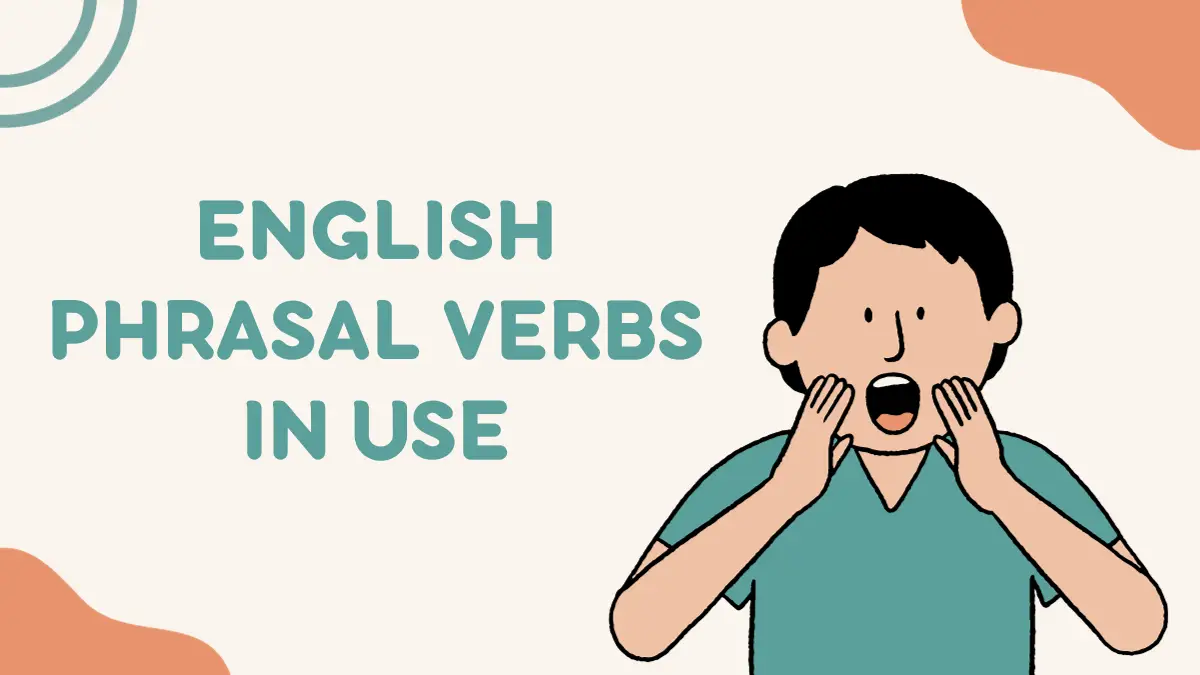Welcome to “Mastering Phrasal Verbs: An Intermediate Guide to Fluent English”. This book is your comprehensive resource for understanding and effectively using English phrasal verbs. Designed specifically for intermediate-level learners (B1 to B2), this book covers an extensive range of phrasal verbs, carefully selected to give you a deep understanding of their usage in different contexts. Topics covered include modern areas like ‘Mobile Devices’, traditional academic areas like ‘Academic Writing’, and daily life situations like ‘Socialising’. Every section is backed by Cambridge’s extensive research, ensuring you learn the English language as it is genuinely spoken and written. Moreover, we’ve included study tips and follow-up tasks to help you practice independently, along with an easy-to-use answer key for self-assessment. Dive in and start mastering the language of global communication!
May Can Help You :
The Most Commonly Used Verbs in the English Language
English Collocations For Phrasal Verbs
100 most used verbs in English with pronunciation
Phrasal Verbs

Phrasal verbs are an integral part of the English language, adding a depth of expression and flexibility to everyday communication. They are a unique combination of a base verb and one or more particles (prepositions or adverbs), which together create a meaning different from the original verb. For example, the phrasal verb ‘look up’ doesn’t literally mean to direct your gaze upwards but rather to search for information. With a diverse range of applications across various topics and scenarios, these versatile linguistic tools can enrich your vocabulary and enhance your fluency. Keep in mind, though, that their meaning is often not deducible from the individual words, making them one of the trickier aspects of mastering English. This guide aims to demystify phrasal verbs, offering clear definitions, ample examples, and practical exercises to bolster your understanding and proficiency.
Phrasal Verbs and Mobile Devices
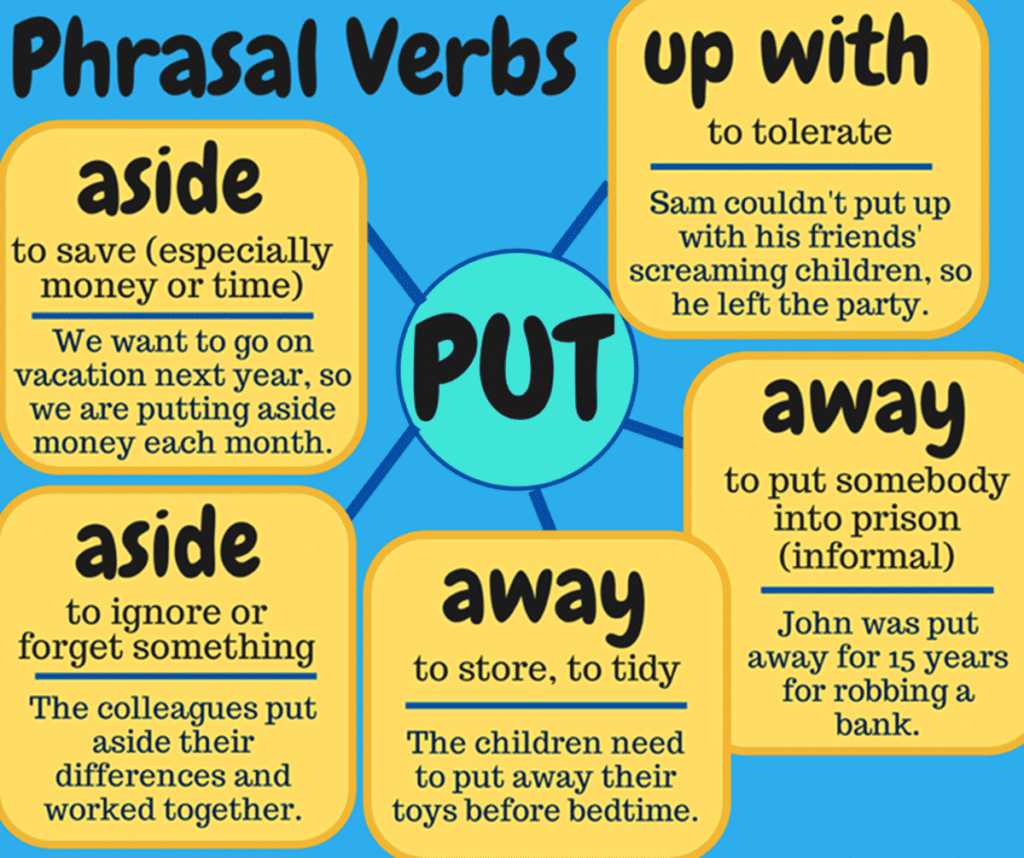
In the realm of mobile devices, phrasal verbs are frequently used, providing a more dynamic way to describe actions and interactions. For instance, the verb ‘log in’ refers to the action of entering your personal details to access a digital account or service, while ‘sign out’ or ‘log out’ implies the act of exiting that account. ‘Swipe right’ and ‘swipe left’, popularized by dating apps, refer to approving or rejecting something on a touchscreen. ‘Scroll up’ and ‘scroll down’ indicate the movement of viewing content on a device’s screen. ‘Switch off’ or ‘turn off’ means to shut down a device, and ‘charge up’ means to replenish a device’s battery. Recognizing and understanding these examples can significantly enhance your ability to converse and write about technology, particularly mobile devices, in English.
Phrasal Verbs in Academic Writing
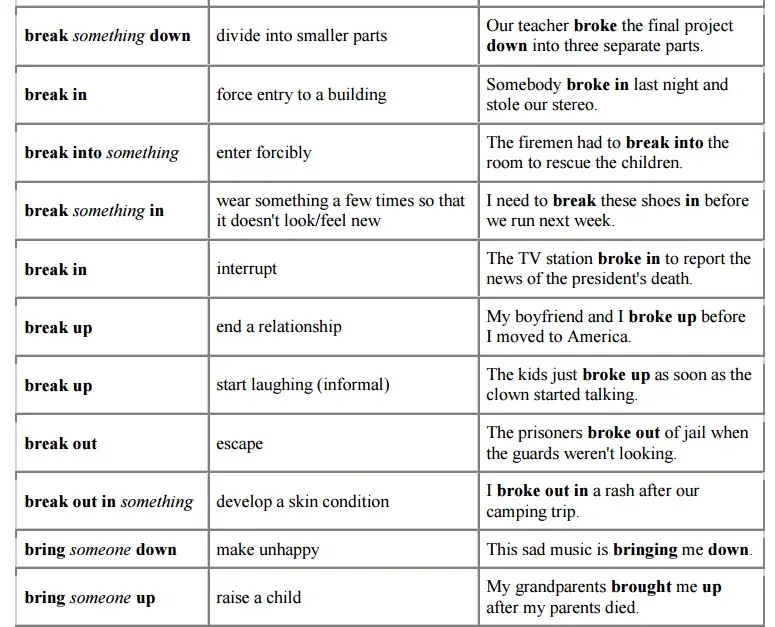
In academic writing, the usage of phrasal verbs can contribute to a more natural and fluent writing style. However, it is crucial to use them appropriately to ensure clarity and formality. ‘Carry out’ is often used to refer to the act of executing a plan or a research study. ‘Set up’, on the other hand, can mean establishing a system or initiating a study. ‘Look into’ signifies the process of investigating a subject or issue, while ‘draw on’ means to use information or expertise. ‘Point out’ is used when highlighting or drawing attention to something, and ‘come up with’ is a casual way to express the act of creating an idea or solution. This section will help you understand the context of using these phrasal verbs and many more in academic writing to enhance your language proficiency and make your writing more engaging.
Socializing with Phrasal Verbs
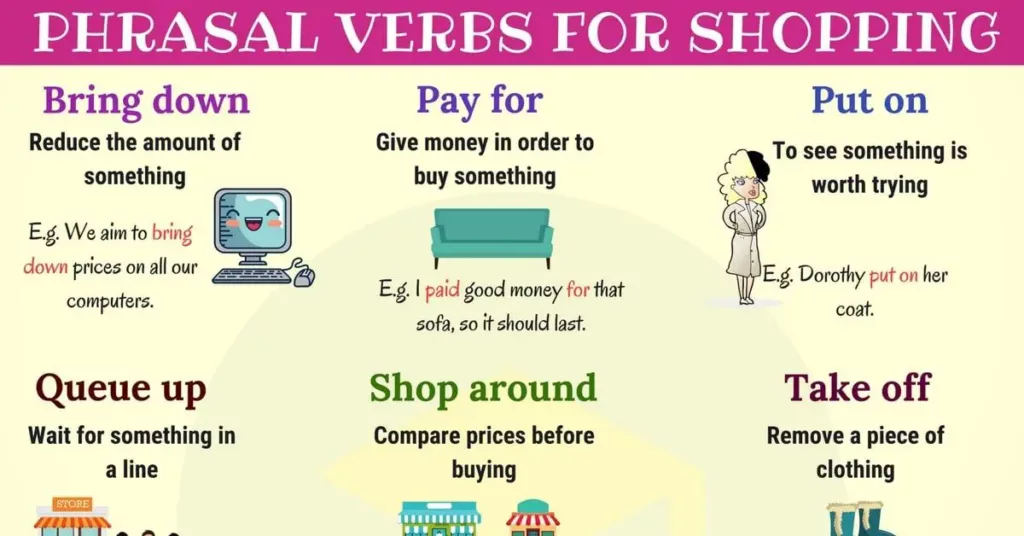
Phrasal verbs are equally invaluable when it comes to socializing. They can significantly improve your conversational English, making your interactions more natural-sounding and relatable. For example, when you ‘catch up’ with someone, you are updating each other on your lives. When you ‘hang out’ with friends, you spend time with them casually. If you ‘bump into’ someone, you meet them unexpectedly. If you ‘look forward to’ an event, it means you are eagerly anticipating it. On the other hand, ‘fall out’ with someone means to have a disagreement that affects the relationship. Understanding the usage of these and many more phrasal verbs can enrich your social interactions, making them more meaningful and enjoyable. In this section, we will delve into these expressions, providing you with ample examples and opportunities to practice.
Phrasal Verbs in Business Communication
Phrasal verbs play a crucial role in business communication as they can help your language sound more natural and informal, aiding in building rapport and fostering better relationships. For instance, ‘set up’ can mean to start a business or project, while ‘take over’ refers to assuming control or responsibility. ‘Bring up’ is often used to introduce a new idea or topic in a meeting, while ‘turn down’ implies rejecting an offer or request. ‘Carry on’ means to continue with a task or duty, and ‘look into’ signifies investigating a problem or situation. To ‘back up’ is to support or vouch for something or someone, and ‘sign off’ refers to approving a document or agreement. Mastering these phrasal verbs and others can enhance your confidence and effectiveness in business communication, and this section will provide you with comprehensive definitions, contextual examples, and practical exercises to do just that.
Phrasal Verbs in Expressing Emotions
Phrasal verbs are particularly powerful in expressing emotions and feelings, adding color and depth to your language. When you ‘cheer up’, you become happier or make someone else feel happier. If you ‘break down’, you lose control of your feelings and start crying. To ‘fall for’ someone means to become romantically attracted to them. When you ‘look up to’ someone, you admire and respect them. ‘Blow off steam’ means to do something to relieve stress or anger. ‘Bottle up’ signifies suppressing or hiding your emotions, while ‘let down’ implies disappointment. Understanding and utilizing these phrasal verbs in your conversations can help you convey your emotions more effectively and empathetically. This section will delve deeper into these expressions, providing you with clear definitions, illustrative examples, and practical exercises to enhance your emotive vocabulary.
Phrasal Verbs in Travel and Tourism

Phrasal verbs are extensively used in the domain of travel and tourism, aiding in the creation of vivid, engaging descriptions of experiences and events. For instance, ‘set off’ is commonly used to denote the start of a journey, while ‘check in’ and ‘check out’ refer to the process of registering your arrival and departure at a hotel. If you ‘get around’ a city, it means you are exploring or navigating it. ‘Look around’ signifies exploring a place by looking at its features, and ‘drop by’ means to visit a place for a short period. ‘Take off’ and ‘land’ are used in the context of air travel to describe the airplane’s ascent and descent. ‘Pick up’ can mean collecting someone or something, such as picking up rental cars or tourists from a pick-up point. Understanding these phrasal verbs can greatly enhance your ability to communicate and understand communication related to travel and tourism. In this section, we will further explore these and other phrasal verbs, equipping you with a rich vocabulary to describe and navigate your travel experiences.
Phrasal Verbs in Health and Medicine
Phrasal verbs also find significant usage in the field of health and medicine, frequently appearing in conversations between healthcare professionals and patients. For instance, ‘come down with’ is used to describe contracting an illness, while ‘get over’ means to recover from an illness. ‘Look after’ signifies taking care of someone, often used in the context of patient care. ‘Pass out’ describes fainting or losing consciousness, while ‘throw up’ means to vomit. ‘Break out’ is used when referring to the sudden appearance of symptoms or a rash on the skin. ‘Check up on’ involves monitoring someone’s health condition or progress in recovery. Understanding the meaning and context of these phrasal verbs can enhance your communication skills in healthcare settings, be it as a professional, a patient, or a caregiver. In this section, we will dive into these and more phrasal verbs related to health and medicine, providing comprehensive definitions, contextual examples, and practical exercises to help you grasp their usage effectively.
Phrasal Verbs in Sports and Leisure
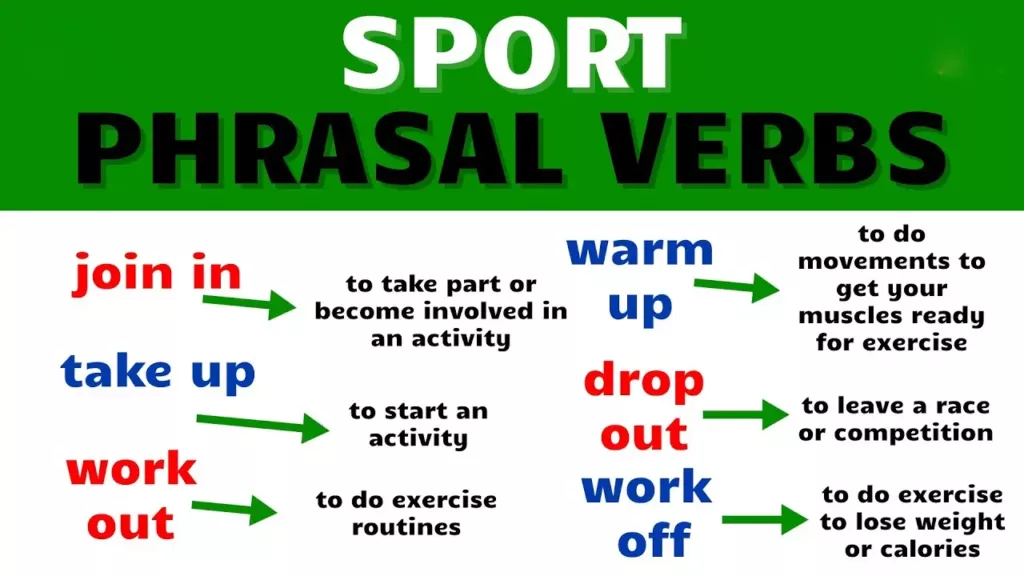
Phrasal verbs are integral to discussing activities related to sports and leisure, offering dynamic ways to describe actions and events. For example, in many sports, players ‘warm up’ before a match to prepare their bodies for the exertion to come. They ‘kick off’ a football game by making the first move, or ‘throw in’ the ball back into play. During leisurely activities, you may ‘pick up’ a new hobby, meaning you start learning or doing something new. If you’re playing a board game, you could ‘give up’ if you decide you can’t win, meaning you stop trying. To ‘catch on’ means to understand or learn something new, like the rules of a new game. If you ‘hang up’ your running shoes, it means you stop running. A proper understanding and use of these, and other phrasal verbs, can enhance your conversation and comprehension when discussing sports and leisure activities. In this section, we will further explore these expressions, providing detailed definitions, contextual examples, and practical exercises to aid your learning.
Review and Practice Exercises for Phrasal Verbs
In this section, we will consolidate your understanding of phrasal verbs through a series of interactive exercises. These are designed to reinforce your grasp of the usage, context, and meaning of common phrasal verbs. For each exercise, a sentence will be provided with a phrasal verb missing. Your task is to choose the most appropriate phrasal verb from the options given.
- I decided to _______ my old hobby of painting during the lockdown. (pick up / let down / back up)
- She had to _______ her plans for the vacation when she fell sick. (carry on / turn down / set off)
- Despite the initial failures, he decided to _______ his efforts to start his own business. (throw up / carry on / fall for)
- The team was able to _______ the project successfully despite the challenges. (take over / set up / drop by)
- She had to _______ a lot of pressure at work but didn’t let it affect her performance. (blow off steam / bottle up / look up to)
Remember, the key to mastering phrasal verbs is practice. Try to incorporate them into your daily conversations to gain fluency and confidence.
Common Mistakes and How to Avoid Them
When learning and using phrasal verbs, several common mistakes can hinder your linguistic progress. One prevalent error is failing to understand the specific context in which a phrasal verb is used, leading to awkward and incorrect usage. For instance, ‘back up’ is often mistakenly used in place of ‘support’, but its correct usage is typically within the context of creating a support or secondary plan. Another common mistake is using the wrong preposition. For example, the phrasal verb ‘look after’ means to take care of, but if replaced with a different preposition like ‘look for’, the meaning changes completely to searching for something. Additionally, learners often confuse verbs with similar phrases, such as ‘turn down’ (to reject) and ‘turn up’ (to arrive or increase). To avoid these pitfalls, it’s important to pay close attention to the context in which phrasal verbs are used, remember the correct prepositions, and practice differentiating between similar verbs. Regular practice via reading, writing, and speaking exercises can significantly improve your command over phrasal verbs. This section will provide more detailed insight into common mistakes made while using phrasal verbs and how to effectively avoid them.
Conclusion
In conclusion, phrasal verbs are a crucial component of English language proficiency, playing a significant role in various contexts such as travel, health, sports, and leisure. Cultivating an understanding of their meaning, usage, and context can enhance your communications and comprehension. However, mastering these requires dedication, practice, and vigilance to avoid common mistakes. Regular reading, writing, and speaking exercises are recommended for improving and retaining your command over phrasal verbs.

